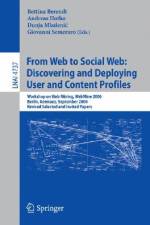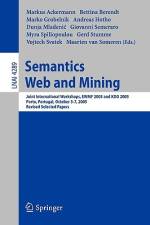- Joint International Workshop, EWMF 2005 and KDO 2005, Porto, Portugal, October 3-7, 2005, Revised Selected Papers
von Markus Ackermann
49,00 €
Finding knowledge - or meaning - in data is the goal of every knowledge d- covery e?ort. Subsequent goals and questions regarding this knowledge di?er amongknowledgediscovery(KD) projectsandapproaches. Onecentralquestion is whether and to what extent the meaning extracted from the data is expressed in a formal way that allows not only humans but also machines to understand and re-use it, i. e. , whether the semantics are formal semantics. Conversely, the input to KD processes di?ers between KD projects and approaches. One central questioniswhetherthebackgroundknowledge,businessunderstanding,etc. that the analyst employs to improve the results of KD is a set of natural-language statements, a theory in a formal language, or somewhere in between. Also, the data that are being mined can be more or less structured and/or accompanied by formal semantics. These questions must be asked in every KD e?ort. Nowhere may they be more pertinent, however, than in KD from Web data ("e;Web mining"e;). This is due especially to the vast amounts and heterogeneity of data and ba- ground knowledge available for Web mining (content, link structure, and - age), and to the re-use of background knowledge and KD results over the Web as a global knowledge repository and activity space. In addition, the (Sem- tic) Web can serve as a publishing space for the results of knowledge discovery from other resources, especially if the whole process is underpinned by common ontologies.



